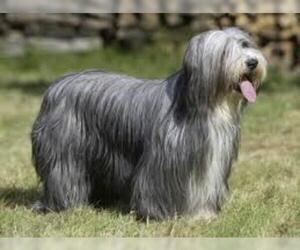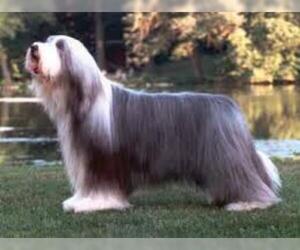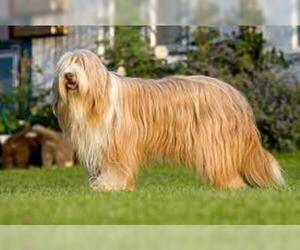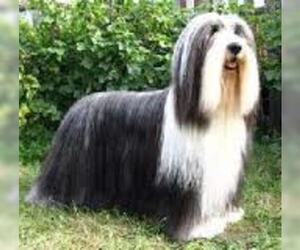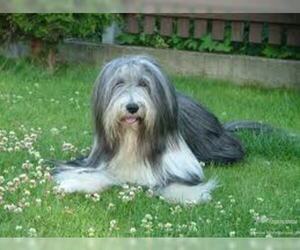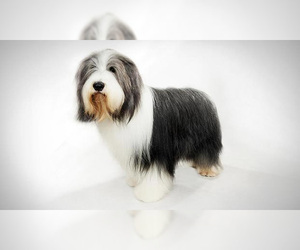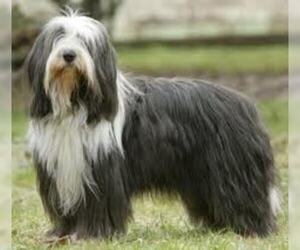
All about Bearded Collie dog breed
A.K.A. :Beardie, Highland Collie, Mountain Collie, Hairy Mou'd Collie, Scotch Collie, Fuzzy Dog, Working Beardie, Show Beardie
Size
Grooming requirements
Exercise requirements
Good with other dogs
Watchdog ability
Energetic
Training requirements
Playful
Affectionate
Good with other pets
Good with children
Good with strangers
Winter
Summer
Healthiness
Protective
Life Span
| Pure Breeds | Member |
| Breeds A - Z | B |
| Breeds by Group | Herding |
| Breeds by Trait | Good With Kids High Stamina Dog Breeds Smartest Dog Breeds |
| Overview: | The Bearded Collie, affectionately known as the "Beardie," is a charming and vivacious herding dog originating from Scotland, where they were prized for their intelligence and ability to work in harsh weather. Physically, they are easily recognizable by their long, shaggy double coat, which comes in various shades like black, blue, brown, or fawn, often with white markings. Beneath the luxurious fur lies a medium-sized, athletic build, indicating their working heritage. Temperamentally, Beardies are known for being playful, intelligent, and outgoing, often displaying a whimsical and slightly clownish demeanor. They are generally excellent with children and other pets, making them a wonderful addition to active families. However, their energetic nature and need for mental stimulation mean they are not well-suited for prolonged apartment living; a home with a yard and owners dedicated to daily exercise and training is ideal. While generally a healthy breed, potential owners should be aware of predispositions to conditions such as hip dysplasia, eye anomalies, and certain autoimmune diseases. Regular grooming is also essential to prevent matting of their distinctive coat. |
F.A.Q.
All You Need to Know About the Bearded Collie BreedThe Bearded Collie, originating in Scotland as a herding dog, is a lively and intelligent companion. Known for their shaggy, flowing double coat, they possess a playful and affectionate temperament, making them wonderful family pets. Their sweet nature and high trainability make them suitable for first-time dog owners, though they do require consistent positive reinforcement training. Physically, they're medium-sized with a distinctive "beard" of hair. While they adore their families, their energetic nature means they aren't ideal for apartment living and thrive with a yard and active owners. Grooming is essential, with daily brushing needed to prevent matting of their long coat, along with regular professional trims. They have high exercise needs, enjoying long walks, playtime, and mental stimulation. Common health considerations include hip dysplasia and eye conditions, so choosing a reputable breeder is key. Overall, the Bearded Collie is a devoted and engaging breed for active households.
The average weight for an adult Bearded Collie is typically between 45-60 pounds.
- Males generally weigh 55-60 pounds.
- Females are usually a bit lighter, ranging from 45-55 pounds.
What is the average height of a Bearded Collie?
If you're wondering, "how tall is a Bearded Collie?", you'll find they are a medium-sized breed with a graceful and agile build. The average height of a Bearded Collie, measured at the shoulder (or withers), typically ranges from 20 to 22 inches.Specifically:- Males generally stand between 21 and 22 inches tall.
- Females are usually slightly smaller, ranging from 20 to 21 inches in height.
Bearded Collie Colors: A Comprehensive GuideBearded Collies come in a beautiful array of colors, with black, blue, brown, and fawn being the AKC recognized Bearded Collie colors. These primary colors can also appear in combination with white markings, commonly on the chest, legs, and tail tip. The amount of white can vary greatly, from minimal to extensive, and it is a perfectly acceptable Bearded Collie coat type.Beyond these officially recognized Bearded Collie colors, there are several rare coat types and exotic Bearded Collie variations that, while not accepted by major kennel clubs like the AKC, do exist within the breed. These include:* Cream: A very light, often off-white or pale yellow, shade.* Brindle: A striped or streaked pattern, typically darker stripes on a lighter base coat.* Lilac: A dilute form of chocolate, appearing as a grayish-brown or lavender hue.* Merle: A pattern characterized by irregular patches of diluted color and solid color, often with blue or odd-colored eyes. This is a very rare Bearded Collie color and can be associated with health concerns if bred irresponsibly.* Chocolate: A rich, dark brown color, distinct from the lighter "brown" recognized by the AKC.When considering Bearded Collie colors, remember that AKC-recognized colors are most commonly seen and desired for conformation showing. Rare Bearded Collie colors and exotic Bearded Collie variations may command different pricing due to their uniqueness, but it's crucial to prioritize breeders who focus on health and temperament, regardless of coat color. Always inquire about the lineage and health clearances of any Bearded Collie, especially when considering rare coat types like merle.
Bearded Collie Personality & TemperamentThe Bearded Collie personality is known for being an outgoing, intelligent, and cheerful companion. They possess a delightful blend of playful energy and deep loyalty, making them wonderful additions to active families. This breed is inherently friendly and sociable, typically greeting strangers with a wagging tail rather than suspicion. Their high intelligence means they are quick learners, though their independent spirit can sometimes manifest as a charming willfulness.Temperament of Bearded Collie with their human "flock" is exceptionally strong; they thrive on companionship and want to be involved in all family activities. They are known for their unwavering loyalty and affectionate nature, often forming deep bonds with their owners. Bearded Collies are generally good with children, displaying patience and a playful demeanor, though supervision is always recommended with very young children due to their herding instincts and boisterous play.Regarding other pets, Bearded Collies typically get along well with other dogs and cats, especially if socialized from a young age. Their herding background can sometimes lead to a desire to "herd" smaller animals or even children, which is usually gentle but can be corrected with training.While adaptable and eager to please, Bearded Collies are not ideal for apartment living. They require significant mental and physical exercise daily to prevent boredom and destructive behaviors. A home with a yard and an active lifestyle that includes regular walks, playtime, and engaging activities is best suited for their energetic and curious nature. Their high energy and need for engagement mean they can become mischievous if under-exercised or left alone for extended periods.
The Bearded Collie temperament is a delightful blend of friendly, sociable, and loyal traits, making them excellent companion dogs. They are known for their outgoing and playful nature, often described as having a youthful exuberance well into adulthood.Beardies are generally very friendly with children, especially when raised alongside them, and their playful spirit makes them wonderful companions for active kids. They typically get along well with other pets, particularly if socialized early. Their innate desire to be part of the family means they thrive on interaction and can be prone to "talkativeness" with characteristic barks and "woo-woos."While intelligent and eager to please, the Bearded Collie personality traits can also include a touch of stubbornness, requiring consistent and positive reinforcement in training. They are also quite sensitive and respond best to gentle guidance rather than harsh correction.Regarding adaptability to apartment living, while their medium size might suggest it, their high energy levels and need for regular exercise make them better suited for homes with a yard or owners committed to daily outdoor activities. They crave mental stimulation and can become bored or destructive if not adequately exercised and engaged. Overall, the Bearded Collie is a charming, affectionate, and intelligent breed that thrives on companionship and an active lifestyle.
Bearded Collie care involves daily maintenance for this intelligent, low-energy companion. Their stunning coat requires regular attention; brush at least 3-4 times a week to prevent mats and keep them looking their best. Professional grooming every 6-8 weeks is highly recommended. Despite their shaggy appearance, Bearded Collies are not brachycephalic; therefore, climate sensitivity is not due to a shortened snout, but their dense coat can make them prone to overheating in hot, humid weather. Provide ample shade and water, and avoid strenuous exercise during peak heat.
Exercise limitations are important to understand; while they enjoy walks, they are not high-stamina athletes. Daily moderate walks and playtime are sufficient to meet their exercise needs. Over-exertion can be detrimental. Dietary considerations include a high-quality commercial dog food appropriate for their age, weight, and activity level. Monitor portion sizes to prevent obesity, a common health concern. Regular wrinkle and ear cleaning is essential. Their facial folds can trap moisture and debris, leading to skin infections. Clean these areas daily with a damp cloth and ensure they are dry. Ear cleaning should be done weekly to prevent ear infections. Common health concerns for Bearded Collies include hip and elbow dysplasia, eye conditions, and certain cancers. Regular veterinary check-ups are crucial for early detection and management. Dental care is paramount; brush teeth daily or provide dental chews to prevent plaque buildup and gum disease. Monitor their weight closely, as obesity can exacerbate joint problems and other health issues. For more on how to care for a Bearded Collie and health tips for Bearded Collie owners, consult your veterinarian.Bearded Collie Activity Level: Energetic Yet BalancedThe Bearded Collie activity level is moderate to high, characterized by a playful and energetic nature, but also a surprising ability to relax. They are not hyperactive, but they do require consistent stimulation.Typical Energy Levels: Bearded Collies possess a good deal of stamina and enjoy being active. They are intelligent and thrive on having a "job" to do, whether it's herding, agility, or engaging in interactive play. Their energy often manifests in bursts of enthusiasm, followed by periods of calm and rest. This balance makes them adaptable, but they are not suited for extremely sedentary lifestyles.Daily Exercise Needs: To maintain their physical and mental well-being, Bearded Collies need a minimum of 60-90 minutes of vigorous exercise daily. This can include long walks, jogging, playing fetch, or off-leash play in a secure area. Without adequate exercise, they can become bored and potentially develop destructive behaviors.Playtime Preferences: Bearded Collies love to play! They enjoy activities that engage their minds as well as their bodies. Fetch, tug-of-war, hide-and-seek, and interactive puzzle toys are excellent choices. They are often enthusiastic participants in dog sports like agility, obedience, and herding trials, which provide an excellent outlet for their energy and intelligence.Limitations Due to Brachycephalic Anatomy: It's important to note that while Bearded Collies are not considered a true brachycephalic breed (like Pugs or Bulldogs), they can have a slightly shorter snout than some other herding breeds. This means they can be more susceptible to overheating, especially during strenuous activity in hot or humid weather. Always monitor your Bearded Collie for signs of overheating (excessive panting, lethargy, drooling) and ensure they have access to shade and fresh water. Avoid intense exercise during the hottest parts of the day.Balance of Energy and Rest: A key characteristic of the how active are Bearded Collie is their ability to balance short bursts of high-energy play with long periods of rest and quiet companionship. They are happy to curl up on the couch with their family after a good run, making them versatile companions.Suitability for Families: Bearded Collies are an excellent fit for active families who are committed to providing daily exercise and mental stimulation. They thrive in environments where they are part of the family's activities and have opportunities for both physical and mental engagement. They are generally not suitable for low-energy households or individuals who cannot dedicate the time and effort required for their exercise needs. Without proper outlets, their intelligent and active minds can lead to frustration and unwanted behaviors.
Breed Breakdown: What Experts Say About the Bearded Collie
I would rate the "Size" trait of the Bearded Collie as a 6.Bearded Collies are considered a medium-sized breed. Their average height typically ranges from 20 to 22 inches at the shoulder, and their weight falls between 45 to 55 pounds. They possess a lean yet robust body structure, designed for agility and endurance rather than bulk.While certainly not a tiny lapdog, they aren't massive either. When compared to other companion dogs, they are larger than breeds like Cavalier King Charles Spaniels or Boston Terriers, but significantly smaller than Great Danes or Irish Wolfhounds. They are comparable in size to breeds like Australian Shepherds or Border Collies.Due to their energetic nature and need for regular exercise, Bearded Collies are generally not ideal for apartment living unless their owners are highly dedicated to providing multiple daily outdoor excursions and have access to parks or open spaces. They thrive in homes with a yard and are well-suited for households with some space, though they can adapt to smaller homes if their exercise needs are consistently met. Their size makes them manageable for travel in a car, but they would require a larger crate than smaller breeds for air travel. They are not a miniature breed, but also not one that will overwhelm a typical home with its physical dimensions.
I would rate the grooming requirements of a Bearded Collie at an 8 out of 10. This is a very high-maintenance breed when it comes to grooming. Their defining feature, the long, shaggy double coat, is prone to matting and requires daily brushing to prevent tangles and remove debris. They shed moderately, but the dense undercoat needs regular attention to prevent excessive shedding and maintain coat health. While they don't have prominent skin folds that require special care, their long ear hair needs regular cleaning and plucking to prevent infections. Nail trimming is essential and needs to be done frequently, as with most dogs. Bathing is also a more involved process due to their thick coat, requiring thorough rinsing and drying to prevent skin issues. While not inherently prone to more skin issues or allergies than other breeds, a neglected coat can certainly lead to them. Compared to many companion dogs, the Bearded Collie's grooming is far from easy, demanding significant time, effort, and often professional help to keep them looking and feeling their best.
I would rate the Bearded Collie's exercise requirements at an 8 out of 10.Bearded Collies are a high-energy, intelligent breed originally bred for herding. They are not dogs that thrive with minimal activity. They require substantial daily exercise to stay physically healthy and mentally stimulated. While they don't have brachycephalic anatomy, meaning they don't have the respiratory limitations of breeds like pugs or bulldogs, their stamina and desire to work mean they can tolerate and enjoy sustained movement. Daily activity recommendations go beyond a simple stroll around the block; they need at least 60-90 minutes of vigorous exercise, often broken into multiple sessions. This can include long walks, running, hiking, and extensive playtime. They excel in activities that engage both their bodies and minds, making them excellent candidates for dog sports like agility, obedience, and herding trials. Without adequate exercise and mental stimulation, Bearded Collies can become bored, destructive, and difficult to manage. They absolutely require structured routines and opportunities to burn off their boundless energy to be well-adjusted and happy companions.
I'd rate the Bearded Collie's "Watchdog Ability" at a 6 out of 10.Bearded Collies are certainly alert and will notice when something is amiss. They possess a good ear for unusual sounds and are generally aware of their surroundings. Their barking behavior is usually a response to something they perceive as out of the ordinary, and they're not typically nuisance barkers. When a stranger approaches the home or a car pulls up, a Beardie will often let out a series of barks to announce the arrival, which provides a meaningful early warning. They do have some territorial instincts, primarily centered around their family and home, and they are not likely to let an unfamiliar person simply waltz in without acknowledging their presence.However, while they are excellent at *alerting* you to a potential issue, they are not typically a breed known for aggressive deterrence. They are more likely to bark and stand their ground, but their natural inclination is more toward being friendly and inquisitive once they've assessed the situation isn't an immediate threat. They are generally not the type of dog that would actively confront and "take down" an intruder. Therefore, they are capable of providing meaningful early warnings in a home environment, but they lean more towards being a vocal alarm system and less of a physical deterrent. They are more of a passive companion in terms of physical protection, but an active participant in sounding the alarm.
I would rate the "Good with Other Dogs" trait of the Bearded Collie breed a 9 out of 10.Bearded Collies are generally known for their good-natured and sociable temperament, extending readily to other canines. They typically exhibit a friendly curiosity rather than aggression around unfamiliar dogs and can adapt well to dogs of various sizes and energy levels, often enjoying playful interactions. While early socialization, like with any breed, is beneficial to ensure they continue to be well-adjusted, it's often more about reinforcing their natural inclination towards sociability rather than overcoming deep-seated issues. They thrive in canine company, often enjoying the companionship and play that comes with a multi-dog household. Their herding instinct can sometimes manifest as gentle nudging or attempts to "organize" other dogs during play, but this is rarely aggressive or dominant and is usually well-tolerated by other dogs. Careful introductions are still wise with any new dog, but with a Bearded Collie, these are typically smooth and result in peaceful coexistence, often blossoming into genuine canine friendships.
I would rate the "Energetic" trait of the Bearded Collie breed a 7 out of 10.Bearded Collies are undeniably an active and spirited breed. They were originally bred as herding dogs, and that inherent drive for activity is still very much present. They have a good amount of stamina and a playful nature, enjoying interactive games and outdoor adventures. They thrive on regular exercise, including long walks, runs, and opportunities to play and explore. Their endurance is quite good, allowing them to participate in dog sports like agility, obedience, and even some endurance activities. Compared to more laid-back companion dogs like a Basset Hound or a Cavalier King Charles Spaniel, the Bearded Collie is significantly more naturally active and requires a substantial outlet for its energy.However, I haven't given them a 9 or 10 because while energetic, they aren't quite the perpetual motion machine of some other high-drive working breeds like a Border Collie or a Jack Russell Terrier. They also benefit from mental stimulation to complement their physical exercise. Crucially, the Bearded Collie is not a brachycephalic breed. They have a normal muzzle length, which means they do not typically suffer from the respiratory issues or reduced stamina associated with brachycephalic anatomy. This allows them to maintain their good exercise tolerance without the breathing difficulties that would limit a brachycephalic dog's ability to participate in energetic activities. Their energy is more sustained and less frantic, making them a fantastic companion for active individuals or families who enjoy an outdoor lifestyle.
I would rate the training requirements of the Bearded Collie a 6 out of 10.While intelligent and eager to please those they love, Bearded Collies are not inherently easy to train with minimal effort. Their intelligence can be a double-edged sword; they pick things up quickly, but they can also figure out how to get their own way if training isn't consistent and clear. They possess a delightful, but sometimes frustrating, independent streak and a playful sense of humor that can manifest as stubbornness, especially if they find something more interesting to do. Their attention span can waver, particularly with repetitive drills, and they thrive on variety and engaging activities. Responsiveness to commands is generally good, but they require a strong foundation and a handler who can be more interesting than a passing squirrel or a fun scent.Consistency is absolutely paramount with a Bearded Collie. They respond wonderfully to positive reinforcement methods and will shut down if harsh corrections are used. Food, praise, and play are excellent motivators. While not impossible for a beginner, a first-time owner will need to be prepared for a significant commitment to structured routines and ongoing training throughout the dog's life. They benefit greatly from early socialization and puppy classes, and often require experienced handling to navigate their charming wilfulness and channel their energy productively. They are not a "set it and forget it" breed; they need consistent mental stimulation and physical activity to be well-behaved companions.
I'd rate the Playful trait of the Bearded Collie a 9 out of 10.Bearded Collies are renowned for their exuberant and perpetually puppy-like demeanor. They are far from inactive, possessing a high energy level that fuels a deep love for games and interaction. Their attention-seeking behavior is often expressed through playful nudges, barks, and an eagerness to involve their humans in whatever fun activity they've envisioned. They respond to toys and playtime with an infectious enthusiasm, treating even mundane walks as an opportunity for adventure. Their overall zest for life is palpable, making them naturally spirited and significantly more energetic and fun-loving than many other companion dogs. They thrive on engagement and see the world as a giant playground, always ready for a new game or a spirited romp.
I would rate the "Affectionate" trait of the Bearded Collie breed a strong 9 out of 10.Bearded Collies are renowned for their profound desire for human companionship and are incredibly people-oriented. They absolutely thrive on affection and integrate themselves completely into their family's lives. You can expect a Beardie to be your shadow, following you from room to room, just wanting to be near you. Physical closeness is very important to them; they are often described as "velcro dogs" and will readily seek out opportunities for cuddling, leaning against you, and yes, even attempting lap-sits despite their size. Their loyalty is unwavering, forming deep bonds with their owners. Furthermore, they are highly sensitive to owner emotions, often picking up on moods and offering comfort or excitement accordingly. While intelligent and capable of independent thought, they are far from emotionally distant and are among the most loving and connected companion dogs you could choose.
I would rate the "Good with Other Pets" trait of the Bearded Collie a 9 out of 10.Bearded Collies are generally known for their good-natured and friendly disposition, which extends to other animals. They typically have a relatively low prey drive compared to some herding or hunting breeds, and while they might initially be curious or enthusiastic around smaller pets like cats, they are rarely aggressive. They are naturally sociable dogs and often enjoy the company of other canines, making them excellent candidates for multi-dog households. While early socialization is beneficial for any breed to ensure polite interactions, a Bearded Collie's inherent temperament often means they adapt quite well to living with other pets with minimal training beyond basic obedience and introductions. Resource guarding is not a prominent trait in the breed, though as with any dog, individual personalities vary, and supervision during feeding or with prized toys is always a good practice. Overall, with proper introductions and continued positive reinforcement, Bearded Collies are highly adaptable and can coexist peacefully and even form strong bonds with a variety of other household pets.
The Bearded Collie rates a strong 8 out of 10 for "Good with Children."This breed is naturally gentle, playful, and affectionate, making them generally excellent companions for children. They possess a good amount of patience and a high tolerance for noise and the occasional clumsy handling that comes with young kids. Their herding instincts can translate into a watchful nature, but this is usually expressed in a protective rather than aggressive way. Bearded Collies thrive on being part of the family action and enjoy interactive play, making them great partners for older, more active children. While they are naturally good-natured, like any breed, early socialization and consistent, positive reinforcement training are beneficial to ensure they are well-adjusted to a family setting and understand boundaries. Supervision is always recommended with very young children and any dog to ensure respectful interactions.
I would rate the "Good with Strangers" trait of the Bearded Collie breed an 8 out of 10. Bearded Collies are generally very sociable and welcoming dogs. They typically exhibit a friendly and outgoing demeanor around unfamiliar adults, often approaching with a wagging tail and an eagerness to interact. While not inherently clingy, they are not usually reserved or shy. Their herding background can sometimes manifest as a watchful nature, meaning they'll be aware of strangers, but this rarely translates into aggression or excessive barking. Instead, it's more of an alert curiosity. They adapt well in public settings and guest-filled environments, enjoying the attention and stimulation. While early socialization is beneficial for any dog, a Bearded Collie's natural inclination is to be quite outgoing and comfortable with new people, requiring less intensive training to achieve this comfort than some more reserved breeds.
I would rate the Bearded Collie's "Winter" tolerance at a 7.Bearded Collies possess a thick, double coat with a soft, woolly undercoat and a shaggy, weatherproof outer coat. This natural insulation provides good protection against cold temperatures, and their overall size is substantial enough to retain body heat effectively. They are not brachycephalic, which mitigates respiratory issues often exacerbated by cold air. While they aren't arctic breeds, their heritage as herding dogs in Scotland implies a degree of resilience to cool, damp weather. They can safely enjoy outdoor activities in moderately cold climates for reasonable durations.However, a rating of 7, not 10, acknowledges that they are not impervious to extreme cold or prolonged exposure. Their long coats can accumulate snow and ice, potentially leading to matting and discomfort, and in very frigid conditions, their paws can become sensitive to freezing surfaces. Compared to other companion dogs, they generally require less special care in winter than short-haired or toy breeds, but more than, say, a Siberian Husky. Owners should be mindful of their coat's condition, check for ice balls between their paw pads, and avoid leaving them outdoors for extended periods in sub-zero temperatures. Their exercise needs remain in winter, but their time outside may need to be adjusted based on the severity of the cold.
I would rate the Bearded Collie's "Summer" tolerance at a 4 out of 10.Bearded Collies, while not brachycephalic, possess a dense, double coat designed for colder climates. This thick insulation, while excellent for winter, makes them highly susceptible to overheating in warm weather. Their ability to regulate body temperature is significantly hampered by this coat, increasing their risk of heatstroke, even during moderate temperatures. Outdoor activity levels must be drastically reduced during summer months, limited to early morning or late evening walks, and strenuous play should be avoided altogether. They require significant climate control during hot weather, often needing access to air conditioning or fans to stay cool. Compared to many other companion dogs, Bearded Collies absolutely require special care in summer months, including meticulous attention to their environment, hydration, and activity levels to prevent serious health issues.
I would rate the Bearded Collie's "Healthiness" trait as a 7 out of 10.Bearded Collies are generally considered a robust breed with a good life expectancy of 12-14 years, which is quite respectable for a medium-to-large dog. They are not typically high-maintenance in terms of health compared to some breeds with severe structural issues or widespread genetic diseases. However, like many purebred dogs, they do have some genetic predispositions that responsible breeders actively screen for and manage. Common health concerns in the breed include hip dysplasia and elbow dysplasia, which are seen across many breeds and can be mitigated through careful breeding practices and proper diet/exercise. Autoimmune diseases, such as Addison's disease and hypothyroidism, also appear with some regularity, and bloat (gastric dilatation-volvulus) is a risk for deep-chested breeds like the Bearded Collie. Skin conditions can sometimes occur, but are not as prevalent or debilitating as in some other breeds. While they don't commonly suffer from breathing difficulties, their coat does require regular grooming to prevent matting, which can lead to skin issues if neglected. With responsible breeding focusing on health clearances and proper preventive care, including a balanced diet, regular exercise, and consistent veterinary check-ups, most Bearded Collies can live long, healthy lives. They are generally more robust than high-maintenance, but not entirely without their specific health considerations.
I'd rate the "Protective" trait of the Bearded Collie a 6 out of 10.While Bearded Collies are incredibly loyal to their families and will certainly alert you to anything amiss, they are not inherently guard dogs in the traditional sense. Their alertness is high; they will notice strangers approaching and are quick to bark, making them excellent watchdogs. This territorial instinct is present, but it's more about announcing an arrival than confronting a threat aggressively. Their reaction to strangers is typically one of initial wariness, which often transitions to a friendly, albeit boisterous, welcome once they determine there's no danger. They are highly devoted to their owners and will instinctively place themselves between their family and perceived threats, but their protective actions are usually limited to barking, nudging, or positioning. They lack the inherent aggression, bite inhibition, or intimidating presence that would qualify them as a highly protective guard dog. They are primarily companion dogs who will enthusiastically perform the role of an alarm system, but they are unlikely to offer meaningful physical protection beyond raising the alarm and perhaps a deterrent display.
Rating: 8Explanation: The Bearded Collie is generally considered a long-lived breed, with an average life expectancy of 12 to 14 years, and many individuals living longer. This places them firmly in the "long-lived" category compared to other companion dogs. While they can be predisposed to certain health issues like hip dysplasia, bloat, and some autoimmune conditions, responsible breeding practices and attentive care can significantly mitigate the impact of these. Their overall robust health and a genetic predisposition towards a good lifespan contribute to their high rating.
Bearded Collie Dogs for adoptionSee all dogs for adoption
Similar Dog Breeds for Bearded Collie
Breed Mixes of Bearded Collie
Quick Breed Selector 0 - not important, 1 - smallest, 10 - largest
Variants & Mistakes :Beardied Collie, Bearided Collie, Beraded Collie, Beared Collie, Bearade Collie, Beardet Collie, Beardid Collie, Berdied Collie, Beardead Collie, Barded Collie, Berded Collie, Bardied Collie, Berdied Colly, Bardied Colly, Berded Colly, Barded Colly, Beardied Colly, Bearided Colly, Beraded Colly, Beared Colly, Bearade Colly, Beardet Colly, Beardid Colly, Beardead Colly, Bradied Collie, Bradied Colly, Beardes Collie, Beardes Colly, Beardis Collie, Beardis Colly, Bearded Colli, Bearded Cokie, Bearded Colie, Bearded Kolly, Bearded Kooly, Bearded Koley, Bearded Colle, Beaded Collie, Beaded Colly, Bardid Collie, Bardid Colly, Berdid Collie, Berdid Colly, Baeded Collie, Baeded Colly, Beardd Collie
